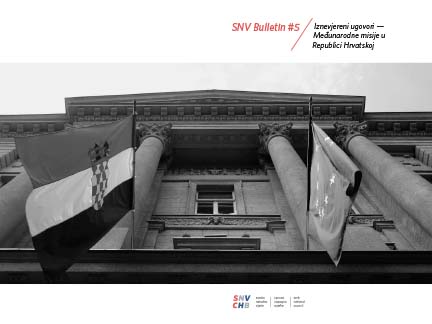Iznevjereni ugovori — Međunarodne misije u Republici Hrvatskoj
Betrayed Agreements — International Missions in the Republic of Croatia
Author(s): Tena Erceg
Subject(s): Politics / Political Sciences, Politics, Law, Constitution, Jurisprudence, International Law, International relations/trade, EU-Legislation
Published by: Srpsko narodno vijeće, Arhiv Srba u Hrvatskoj
Keywords: Office of the UN High Commissioner for
Human Rights (OHCHR); UNHCR; UNTAES; OSCE; Council of Europe; European Union; International Missions
in the Republic of Croatia;
Summary/Abstract: When political turmoil began in former Yugoslavia, European Community (EC) was not prepared for the conflict on the European soil. NATO sought from its members in November 1991 to act diplomatically in the Yugoslav conflict, while the U.S. which initially publicly supported Yugoslavia’s unity, later said that borders could be changed only peacefully. At the beginning of the summer 1991 the EC managed to arrange calming of tensions and withdrawal of JNA troops to the barracks, while Slovenia and Croatia agreed to delay implementation of their independence for three months. Brijuni Agreement was signed and the European Community Monitoring Mission (ECMM) was established which was supposed to oversee implementation of the agreement. At the same time Peace Conference on Yugoslavia was organized and the European arbitration commission was established, the so called ‘Badinter Commission’ which dealt with the legal dimension of the collapse of Yugoslavia. But the European Community’s efforts bore no results, the intensity of war increased, the UN took on the role of the mediator and in September it declared the arms embargo for all the warring parties. At the beginning of January 1992 cessation of hostilities was achieved with the UN mediation and in February 1992 UN Security Council brought a 743 Resolution about sending 14,000 troops to the so called UNPA zones in Croatia. Although Badinter’s Commission in December 1991 still had not sent its opinion and although the UN Secretary General claimed that “premature selective recognition of Croatia’s independence could lead to catastrophic consequences”, German Minister of Foreign Affairs, Hans-Dietrich-Genscher informed the EC ministers that Germany intended to recognize independence of Croatia and Slovenia which on 15 January led to Croatia’s recognition by the EC as a whole. In the beginning of April 1992, war in Bosnia-Herzegovina started and the international community did not manage to protect safe havens in that country.
Series: SNV Bilten
- Print-ISBN-13: 978-953-7442-24-8
- Page Count: 57
- Publication Year: 2015
- Language: English, Croatian
- eBook-PDF
- Sample-PDF
- Introduction

